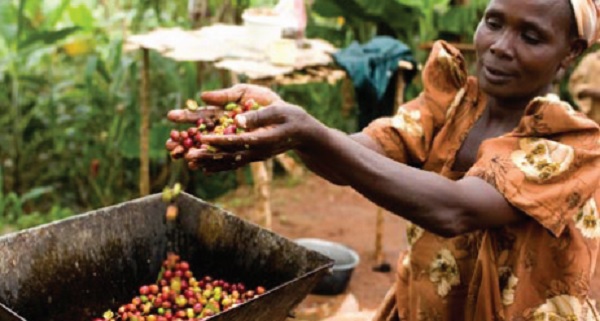
Promoting quality
The Fairtrade arrangement comes at a time when Uganda has prioritised improving coffee quality right from the farm to the market.
Coffee is already a leading export earner for the country, but the Uganda Coffee Development Authority (UCDA); a government agency that oversees the coffee industry, wants output to match the rising consumption of coffee worldwide.
UCDA’s Director Development Services, Kamugisha Apollo Tugume, says because the coffee trade is liberised, some players come in with a focus on profits and don’t care about quality.
In response, UCDA is carrying out a coffee farmers’ census throughout the country to ease monitoring, especially on quality issues. It plans to award best farmers but it has also been closing any coffee processing plants found to be producing poor quality coffee and arrest individuals implicated in undermining quality of coffee.
At the marketing stage Kamugisha says that Ugandan coffee is not branded on the world market and UCDA’s Strategy 2020 aims to change that.
“It’s a shame that countries like Egypt don’t have a single coffee tree have brands of coffee called Egyptian on the world market whereas a big exporter like Uganda doesn’t have,” he said.
Uganda is ranked number two as Africa’s leading coffee exporter next to Ethiopia and number eight in the world. It produced 5.4 million bags in 2016/17, up from 4.5million bags in 2015/16 bringing in US$450m (Shs 1.6 trillion) which is 20% of the total foreign exchange earnings for the period.
UCDA’s target for this financial year is to export 6.2 million bags whereas they target up to 20 million coffee bags by 2025-2030 bringing in between US$ 1.5-2.2 billion in foreign exchange earnings under the so-called ‘coffee road map’.
Kamugisha says they distribute millions of seedlings to farmers through Operation Wealth Creation; a government poverty alleviation programme. Of course not all of them are handled well at farm level but good farm management practices like watering, weeding, and mulching are raising productivity. Changing weather patterns which cause water stress in some part of the coffee growing regions and pests and diseases like coffee wilt and the Black Coffee Twig Borer also are a challenge.
“With a good climate and fertile land compared to our competitors Uganda even has an opportunity to be the leading world exporter,” Kamugisha said in an interview at the UCDA head office on Coffee House, Jinja Road, in Kampala.
He added that UCDA has plans to tackle the low consumption of coffee on the local market through so-called coffee bars – over 100 – all over the country.
“There is also close to 10 companies which are adding value to coffee for local consumption and export,” he says.
Besides Fairtrade, there are other arrangements similar to Fairtrade in the different coffee growing regions on the country where associations of farmers have been awarded export licenses with conditions set by the different consumers where the coffee is exported. These include Organic Coffee, Common Code for Coffee Commodity (4C), UTZ and Bird Friendly. For Organic Coffee for instance, the key condition is that farmers are only supposed to use organic methods of farming.
“The similarity between these associations is providing a good price to coffee farmers and ability to export directly without going through middlemen who usually cheat farmers,” Buwuule explains.
Giving back to community
CECOFA contributes to the community by providing jobs in the areas where they operate both at the coffee huller and on the coffee farms. The CECOFA huller and office employs 17 regular workers, nine of them permanent. The temporary workers shoot up to about 60 at harvest time, around November.
CECOFA also contributes to social services. It has so far constructed three boreholes for residents to get clean water, maintains sections of the feeder roads, and organise coffee youth clubs. They now have about 200 youths who, apart from farming coffee, do sports and support each other to avoid bad habits like gambling and use of drugs. CECOFA has also constructed church for the Born Again Christians. Among the future plans CECOFA has, Buwuule says they want buy an ambulance and to build health facilities in the areas where they operate as the nearest government hospital is at Mpigi about 20 kilometres away.
“We also want to establish a nursery where our farmers can get quality coffee seedlings at a subsidised price,” Buwuule said.
As a parting word, Buwuule wants the government to invest more in training of coffee farmers through exchange visits with other coffee growing countries to do benchmarking, provide affordable credit, and farm inputs like irrigation equipment. He wants more of the improved “Seven Line” variety of coffee being developed by the National Agricultural Research Organisation (NARO) in Mukono District because it is resistant to many diseases.
 The Independent Uganda: You get the Truth we Pay the Price
The Independent Uganda: You get the Truth we Pay the Price



Having worked for a year now at Central coffee Farmers Association (CECOFA) as a Social and sustainability Manager, i find there is a tremendous change in as far as farmers livelihoods is concerned. Socially, the farmers in Mubende and Luweero districts are testifying the projects undergoing implementation with funding from premium funds got from Fair trade.
One challenge am noticing is the delay in funding from the social lenders. This delay has led farmers do what is commonly called “side selling” to middle men to meet their pressing demands. Probably there is need to have more than one lender to mitigate this crisis but so far the trend is promising.
Thanks also go to the Fair trade Uganda Network and particularly Justine Namayanja for her continued support in empowering the producer organizations in capacity building and organizing seminars geared towards developing these Pos